
Canada's long and complex relationship with the United States has had a significant impact on its history, economy, and culture. The two countries consider themselves among the "closest [of] allies". They share the longest border between any two nations in the world, and also have significant military interoperability. Both Americans and Canadians have generally ranked each other as one of their respective "favorite nations". Canadian peacekeeping is deeply embedded in Canadian culture and a distinguishing feature that Canadians feel sets their foreign policy apart from the United States. Canadian Anti-Americanism manifests itself in a variety of ways, ranging from political, to cultural.

The Iran–Contra affair, often referred to as the Iran–Contra scandal, was a political scandal in the United States that occurred during the second term of the Reagan administration. Between 1981 and 1986, senior administration officials secretly facilitated the illegal sale of arms to Iran, which was subject to an arms embargo at the time. The administration hoped to use the proceeds of the arms sale to fund the Contras, an anti-Sandinista rebel group in Nicaragua. Under the Boland Amendment, further funding of the Contras by legislative appropriations was prohibited by Congress, but the Reagan administration figured out a loophole by secretively using non-appropriated funds instead.

The 1984 United States presidential election was the 50th quadrennial presidential election held on Tuesday, November 6, 1984. Incumbent Republican president Ronald Reagan was re-elected to a second term defeating Democratic former vice president Walter Mondale in a landslide victory.
This section of the timeline of United States history concerns events from 1970 to 1989

Willis David Gradison Jr. is an American politician from Ohio who served in the United States House of Representatives from 1975 to 1993.
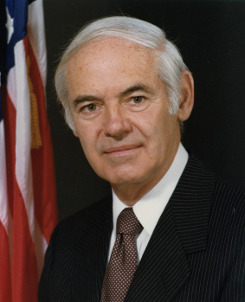
William French Smith II was an American lawyer and the 74th United States Attorney General. After attaining his law degree from Harvard Law School in 1942, Smith went on to join the law firm of Gibson, Dunn & Crutcher LLP in 1946. Smith became acquainted with California governor candidate Ronald Reagan in 1966, after which Reagan appointed him to the University of California Board of Regents. Smith was nominated for U.S. Attorney General shortly after Reagan's victory in the 1980 United States presidential election, assuming the title on January 23, 1981, and serving until February 25, 1985.

Machias Seal Island is an island in disputed water between the Gulf of Maine and the Bay of Fundy, about 16 km (10 mi) southeast from Cutler, Maine, and 19 km (12 mi) southwest of Grand Manan Island, New Brunswick. Sovereignty of the island is disputed by the United States and Canada. The Canadian Coast Guard continues to staff a lighthouse on the island; the first lighthouse was constructed there in 1832.
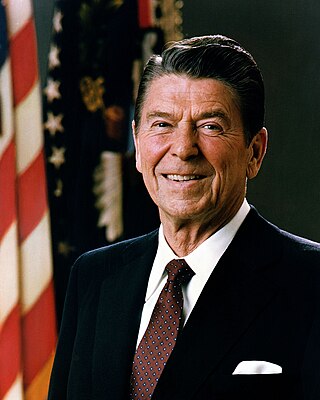
Ronald Reagan's tenure as the 40th president of the United States began with his first inauguration on January 20, 1981, and ended on January 20, 1989. Reagan, a Republican from California, took office following his landslide victory over Democrat incumbent president Jimmy Carter and independent congressman John B. Anderson in the 1980 presidential election. Four years later, in the 1984 presidential election, he defeated former Democratic vice president Walter Mondale, to win re-election in a larger landslide. Reagan was limited to two terms and was succeeded by his vice president, George H. W. Bush, who won the 1988 presidential election. Reagan's 1980 landslide election resulted from a dramatic conservative shift to the right in American politics, including a loss of confidence in liberal, New Deal, and Great Society programs and priorities that had dominated the national agenda since the 1930s.
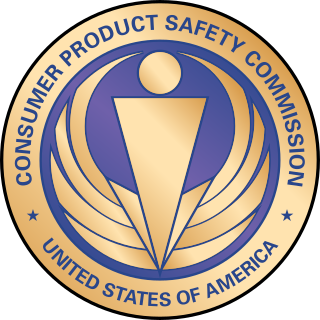
The United States Consumer Product Safety Commission is an independent agency of the United States government. The CPSC seeks to promote the safety of consumer products by addressing "unreasonable risks" of injury ; developing uniform safety standards ; and conducting research into product-related illness and injury. In part due to its small size, the CPSC attempts to coordinate with outside parties—including companies and consumer advocates—to leverage resources and expertise to achieve outcomes that advance consumer safety. The agency was created in 1972 through the Consumer Product Safety Act. The agency reports to Congress and the President; it is not part of any other department or agency in the federal government. The CPSC has five commissioners, who are nominated by the president and confirmed by the Senate for staggered seven-year terms. Historically, the commission was often run by three commissioners or fewer. Since 2009, however, the agency has generally been led by five commissioners, one of whom serves as chairman. The commissioners set policy for the CPSC. The CPSC is headquartered in Bethesda, Maryland.
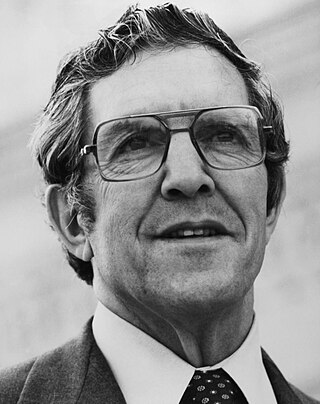
Ellis James Abdnor was an American politician who served as a member of the United States Senate from South Dakota. He was also the 15th Administrator of the Small Business Administration under presidents Ronald Reagan and George H. W. Bush.

Thomas W. Riggs Jr. was an American engineer who worked extensively in Alaska Territory, first as a leader of the team which surveyed the Alaska-Canada border and later as a Commissioner oversee construction of the Alaska Railroad. He was appointed Governor of Alaska Territory and served from 1918 till 1921. During his later life, Riggs served as United States Commissioner to the International Boundary Commission.

The 1984 United States Senate elections were held on November 6, with the 33 seats of Class 2 contested in regular elections. They coincided with the landslide re-election of President Ronald Reagan in the presidential election. In spite of the lopsided presidential race, Reagan's Republican Party suffered a net loss of two Senate seats to the Democrats, although it retained control of the Senate with a reduced 53–47 majority. Democrats defeated incumbents in Illinois and Iowa, and won an open seat in Tennessee, while Republicans defeated an incumbent in Kentucky.

The United States International Trade Commission is an agency of the United States federal government that advises the legislative and executive branches on matters of trade. It is an independent, bipartisan entity that analyzes trade issues such as tariffs and competitiveness and publishes reports. As a quasi-judicial entity, the USITC investigates the impact of imports on U.S. industries, and directs actions against unfair trade practices, such as subsidies; dumping; and intellectual property infringement, including copyright infringement.
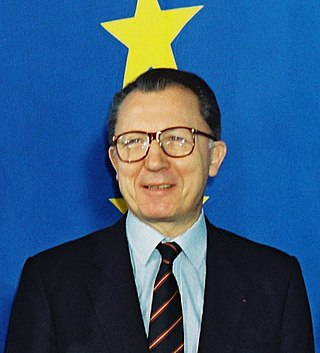
The Delors Commission was the administration of Jacques Delors, the eighth President of the European Commission. Delors presided over the European Commission for three terms. The first term lasted from 1985 to 1988, the second until 1992 and the final one until 1994, making Delors the longest serving president, and his Commission is also seen as the most successful at advancing European integration. It was the only Commission to serve three times, and Delors served five two-year terms. The third Commission was the first Commission of the European Union, the Maastricht Treaty having come into force in 1993.

The International Boundary Commission is a bi-national organization responsible for surveying and mapping the Canada–United States border and regulating construction close to the border. The commission was created in 1908 and made permanent by a treaty in 1925.
American foreign policy during the presidency of Ronald Reagan (1981–1989) focused heavily on the Cold War which was rapidly intensifying. The US government pursued a policy of containment and rollback with regards to communist regimes. The Reagan Doctrine operationalized these goals as the United States offered financial, logistical, training, and military equipment to anti-communist opposition in Afghanistan, Angola, and Nicaragua. He expanded support to anti-communist movements in Central and Eastern Europe.

Raymond P. Martinez was a Senior Advisor at the U.S. Department of Transportation and the former Administrator of the Federal Motor Carrier Safety Administration. From 2010 to 2018, Martinez served as the New Jersey Motor Vehicle Commission Chair and Chief Administrator in the Cabinet of Governor Chris Christie. He previously served as Deputy Chief of Protocol for the United States Department of State and as Commissioner of the New York Department of Motor Vehicles in the Cabinet of Governor George Pataki.
The presidency of Ronald Reagan began on January 20, 1981, when Ronald Reagan was inaugurated as the 40th president of the United States, and ended on January 20, 1989.

President Ronald Reagan authorized the formation of his 1984 reelection campaign committee, Reagan-Bush '84, on October 17, 1983. He made the formal announcement of his candidacy for re-election on January 29, 1984. On August 23, 1984, he secured the nomination of the Republican Party at its convention in Dallas, Texas. The convention nominated Vice President George H. W. Bush as his running mate.
















